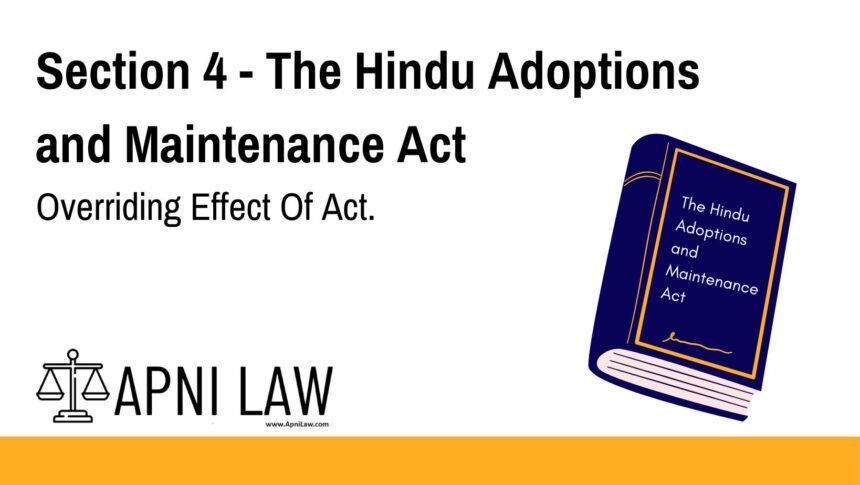Code: Section 4 – Overriding Effect of Act
Save as otherwise expressly provided in this Act,—
(a) any text, rule or interpretation of Hindu law or any custom or usage as part of that law in force immediately before the commencement of this Act shall cease to have effect with respect to any matter for which provision is made in this Act;
(b) any other law in force immediately before the commencement of this Act shall cease to apply to Hindus in so far as it is inconsistent with any of the provisions contained in this Act.
Explanation of Section 4 – Overriding Effect of Act
Section 4 is a crucial provision in the Hindu Adoptions and Maintenance Act, 1956, as it establishes the supremacy of this Act over prior Hindu laws, customs, usages, and other general laws that may have previously applied to Hindus in the context of adoption and maintenance.
Key Points:
1. Supersession of Earlier Hindu Law:
- Any text, rule, interpretation, or custom of Hindu law that existed before this Act and pertains to matters covered by this Act is rendered ineffective. This ensures uniformity and codification in the legal framework governing adoption and maintenance among Hindus.
2. Override of Conflicting General Laws:
- Any other existing law (not necessarily based on Hindu law) that contradicts the provisions of this Act will not apply to Hindus with respect to such inconsistencies.
3. Preservation of Express Provisions:
- The section includes the phrase “save as otherwise expressly provided,” which means that if this Act itself explicitly allows for certain customs or previous laws to remain in effect, they will continue to apply.
Illustration
Example 1: Customary Law vs. Statutory Provision
Before 1956, certain Hindu communities followed a custom that allowed adoption of married children. However, the Hindu Adoptions and Maintenance Act prohibits such adoptions. Under Section 4(a), the earlier custom ceases to have legal effect, and the statutory rule prevails.
Example 2: Conflict with General Law
Suppose another general civil law allowed adoption procedures not permitted under this Act. According to Section 4(b), that general law would not apply to Hindus to the extent of its inconsistency with the Hindu Adoptions and Maintenance Act.
Common Questions and Answers
1. What is the purpose of Section 4?
The purpose is to give this Act overriding authority over all previous Hindu law customs, usages, and other inconsistent laws with respect to matters covered in the Act.
2. Does this mean all customs and usages are invalid?
No. Only those customs and usages that are inconsistent with the provisions of this Act are rendered ineffective. Others may still apply if not in conflict and not explicitly overridden.
3. Can older laws still be used for interpretation?
Only if they are consistent with this Act. Otherwise, they have no legal effect in relation to the matters governed by the Act.
4. Does Section 4 apply to all Hindus uniformly?
Yes. This Act was enacted to standardize and codify Hindu law across India, so its provisions apply uniformly to all Hindus unless an exception is explicitly mentioned in the Act.
Conclusion
Section 4 of the Hindu Adoptions and Maintenance Act, 1956 serves a foundational role in establishing the authority of the Act. It ensures that prior inconsistent customs, usages, and interpretations of Hindu law or any other general law do not interfere with the implementation of this Act. This provision reinforces legal certainty and coherence in matters relating to adoption and maintenance among Hindus.
For more detailed insights on Hindu family law and related legal provisions, visit ApniLaw.








